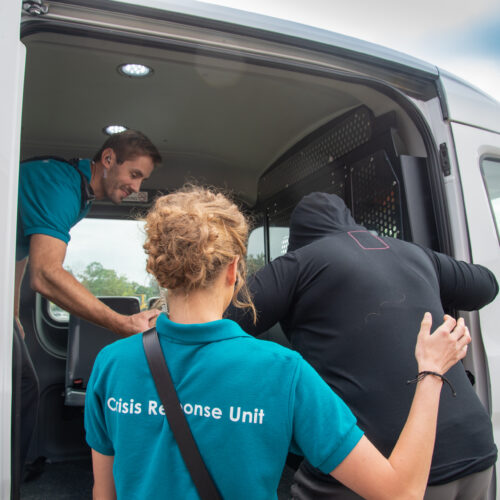
Three Things to Know About New Jersey’s Groundbreaking Community Response Legislation
In response to growing calls for police reform in New Jersey, particularly following the shootings of Najee Seabrooks and Andrew Washington in March and August 2023, a coalition of law enforcement officials, mental health professionals, and community advocates partnered to explore public safety response alternatives. The result was groundbreaking, statewide legislation signed into law by Governor Phil Murphy on January 12, 2024.
The Seabrooks-Washington Community-Led Crisis Response Act, also known as Law A-5326/S-4250, is intended to establish community crisis response teams across the state to support individuals and communities experiencing mental health crises, reduce encounters with police, and provide trauma-informed services and resources. The bill also emphasizes violence intervention, harm reduction, and the involvement of credible messengers impacted by police violence in crisis situations. To achieve these goals, it mandates the creation of a Community Crisis Response Advisory Council and a corresponding community crisis response pilot program, allocating $12 million to aid grant recipients from 6 eligible counties—Camden, Essex, Hudson, Mercer, Middlesex, and Passaic—and to support the Department of Law and Public Safety in the bill’s implementation.
Combined with other innovative response models, such as ARRIVE Together and the state’s 988 mobile response programs, New Jersey’s collaborative efforts to address mental health crises by advancing state legislation make them one of the pioneering states to do so. These efforts also help provide a model for other states as they look to enact similar legislation. Below are three takeaways states can learn from New Jersey’s legislative efforts as they work to create their own.
1. The successful passage of the Seabrooks-Washington Community-Led Crisis Response Act relied heavily on the involvement of a wide range of stakeholders, including community organizations, advocacy groups, law enforcement, mental health professionals, public health experts, and state officials.
The idea for the legislation was built by a broad coalition of people, which ensured that multiple perspectives were considered and that the initiative had widespread support, both in the community and among state officials. Two main ways that New Jersey achieved this were through continuous engagement with community members and support from the Attorney General’s Office.
The involvement of the Attorney General’s Office was critical, as their support helped proponents navigate the legislative process, address legal concerns, and secure necessary endorsements from key political figures. Additionally, public forums, town hall meetings, and surveys were used to gather input and build grassroots support initially and at every step of the process. This inclusive approach ensured that the act would be responsive to the real needs and concerns of the community.
2. Advocates for the Seabrooks-Washington Act also relied on data and research to highlight the benefits of community-based interventions over traditional policing methods for handling nonviolent incidents.
Several relationships proved instrumental in advancing this act, including partnerships with research and policy experts from universities and other research institutions. This collaboration helped the coalition gather evidence from similar community-led crisis interventions that have successfully reduced crime, improved safety, and enhanced community well-being across the U.S. They also worked together to collect call data from across the state as well as case studies from New Jersey and other states that elevated the efficacy of community-led models as alternatives to policing. These efforts helped the coalition make a strong case for the need of a statewide community-led initiative.
3. The new law emphasizes the establishment of a 13-member council to provide the Department of Law and Public Safety with best practices and recommendations.
Demonstrating the coalition’s commitment to empowering communities and fostering trust, one of the core components of the legislation is that it establishes an advisory council of experienced individuals to offer guidance and expertise in establishing and implementing effective community crisis response teams. Seven members of the council are required to either have had prior involvement with the justice system; expertise in crisis response, harm reduction services, or both; or experience advocating for their communities. The council is also mandated to submit an annual report on the effectiveness of community-based crisis intervention programs, enabling ongoing monitoring and evaluation of the initiatives’ impact and success rates.
By institutionalizing the advisory council within the legislation, the new law ensures that any alternative and viable strategies for supporting community responder programs are consistently reviewed and enhanced when successful. The advisory council’s inclusion is expected to play a pivotal role in guiding, monitoring, and promoting the community crisis response pilot program, ultimately contributing to its successful implementation and long-term impact.
For more information on how jurisdictions can develop and sustain community responder programs nationwide, including additional tips for advancing legislation, visit Expanding First Response: A Toolkit for Community Responder Programs.
Photo Credit: New Jersey State Capitol by Lowlova via Wikipedia Commons
ABOUT THE AUTHOR

The sharp rise in school shootings over the past 25 years has led school officials across the U.S.…
Read MoreA three-digit crisis line, 988, launched two years ago to supplement—not necessarily replace—911. Calling 988 simplifies access to…
Read MoreIt would hardly be controversial to expect an ambulance to arrive if someone called 911 for a physical…
Read More Taking the HEAT Out of Campus Crises: A Proactive Approach to College Safety
Taking the HEAT Out of Campus Crises: A Proactive Approach to College Safety
The sharp rise in school shootings over the past 25 years has…
Read More From 911 to 988: Salt Lake City’s Innovative Dispatch Diversion Program Gives More Crisis Options
From 911 to 988: Salt Lake City’s Innovative Dispatch Diversion Program Gives More Crisis Options
A three-digit crisis line, 988, launched two years ago to supplement—not necessarily…
Read More Matching Care to Need: 5 Facts on How to Improve Behavioral Health Crisis Response
Matching Care to Need: 5 Facts on How to Improve Behavioral Health Crisis Response
It would hardly be controversial to expect an ambulance to arrive if…
Read More Developing a Common Definition for Community Responder Programs
Developing a Common Definition for Community Responder Programs
This May, the state of Washington passed legislation supporting the expansion of…
Read More











